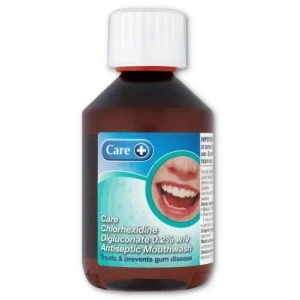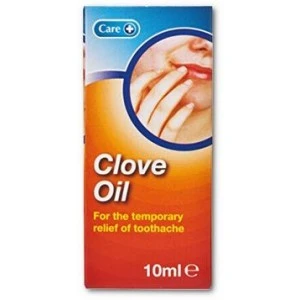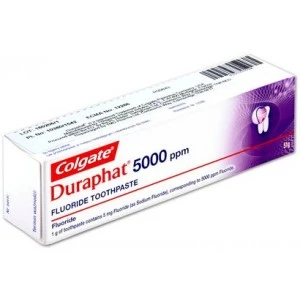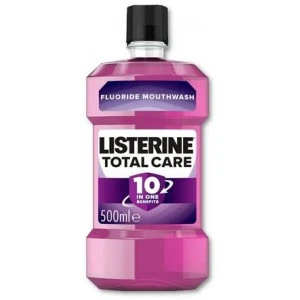Dental care
Our online pharmacy offers a wide range of dental care products, including prescription-strength toothpaste and mouthwashes.
We dispatch all items in discreet packaging to ensure your privacy is protected.
Chlorhexidine Mouthwash
- Easy to use
- Prevents and treats gum disease
- Available without a prescription
Clove Oil
- Numbs toothache
- Reduces inflammation
- Applied directly to the tooth
Colgate Duraphat Toothpaste
- Fights tooth decay
- Protects enamel
- Available from a UK-registered pharmacy
Listerine Total Care
- Freshens breath
- Kills bacteria
- Available in a variety of flavours
The importance of oral health
Your mouth is crucial and plays a vital role in many of your body's natural functions, including breathing and eating. As a result, damage to the mouth can have a profoundly detrimental impact on two of the body's most vital functions.
It's essential to brush your teeth twice daily for at least 2 minutes, both in the morning and at night.
Use a pea-sized amount of toothpaste to brush your teeth. Using more toothpaste than recommended can damage your teeth's enamel.
There is a range of different types of toothpaste that offer various benefits in addition to cleaning your teeth. Sensodyne, for instance, is specifically formulated for individuals with sensitive teeth.
The most important ingredient of toothpaste is fluoride. Fluoride helps strengthen the enamel of your teeth, the outermost protective layer.
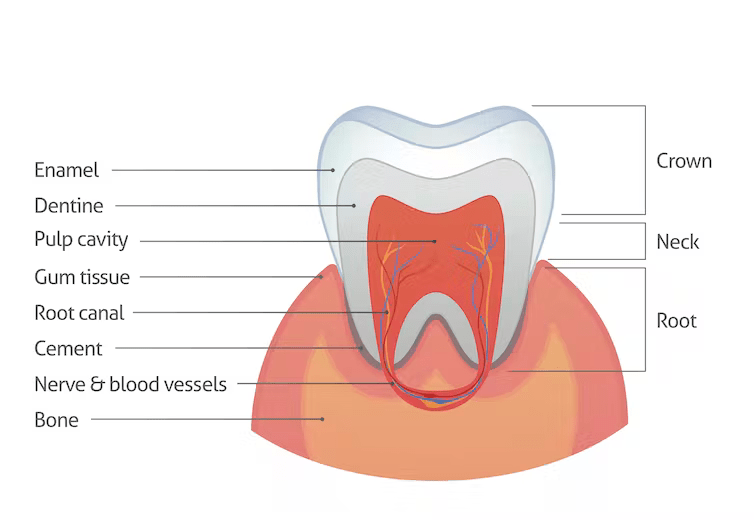
While most toothpaste is available over the counter from pharmacies and supermarkets, some toothpaste, such as Colgate Duraphat, is only available on prescription due to its high fluoride content.
The type of toothpaste you should use can be discussed with your dentist.
You should use a proper brushing technique. Brush vertically - up and down from gum to gum. Make sure to brush all of your teeth evenly, even the backs of them (the part you don't show when you smile).
It is recommended that you change your toothbrush every 3 to 4 months. As you use your toothbrush, the bristles split and fray, reducing their effectiveness in cleaning away plaque.
Do I need to use an electric toothbrush?
Electric toothbrushes can make it easier to clean your teeth, though you don't need one if you use the correct technique.
Many electric toothbrushes offer the ability to change the brush head at the end, making the process of switching brushes more straightforward and more economical than with a manual toothbrush.
Do I need to floss?
Flossing is recommended starting from the age of 12. It helps to remove plaque from between your teeth.
Dental floss is usually available as a mint-flavoured thread which is either wound like a bobbin of thread or affixed to a plastic arm, similar to a violin bow.
There are also flossing devices which shoot a narrow jet of water at high pressure to clean between your teeth.
Flossing is often performed to remove plaque from the spaces between your teeth, which a regular toothbrush can't reach.
Do I need to use mouthwash?
Rinsing your mouth with a mouthwash, such as Listerine Total Care, can help remove food particles that your toothbrush may not reach and freshen your breath.
There are several different mouthwashes available on the market. While they all work in the same way, some of them contain additional ingredients, such as chlorhexidine, alcohol, fluoride and, in some cases, bleach (peroxide).
However, it's not necessary to use mouthwash.
If you do choose to use mouthwash, many dentists and the NHS recommend skipping mouthwash straight after brushing. Using mouthwash right after brushing your teeth can wash away the fluoride, reducing its effect on your teeth, even if the mouthwash you use contains fluoride.
Mouthwash cannot remove plaque from your teeth, though it can lessen the damaging effects of plaque.
Should I chew gum after a meal?
The benefits of chewing gum after eating have been widely debated. Chewing sugar-free gum after eating a meal can help your mouth produce more saliva.
This increase in saliva can help to wash away the plaque which builds up on your teeth. Moreover, the sticky nature of chewing gum can help to dislodge bits of food which might be caught in your teeth.
However, be cautious when using sugar-free chewing gum, as it is likely to contain a sweetener called sorbitol. When taken in large quantities, sorbitol can have a laxative effect.
Always spit out your gum into a bin when you have finished chewing it. It's a common myth that swallowed gum will take seven years to digest or that it sticks to the inside of you and clogs you up. The fact is, chewing gum will eventually be passed through your body like everything else. However, chewing gum offers no nutritional value, so it's advised not to swallow it.
What can happen from poor oral health?
Poor oral health can cause more than just bad breath.
Tooth decay is when the enamel (the outer shell of the tooth) becomes damaged. Cavities (holes) may develop on the surface, exposing the dentin or pulp, which can expose the nerves. Tooth decay can cause a toothache, which can make eating, drinking, or even breathing painful. Clove Oil can be used to relieve tooth pain.
Gingivitis, or inflammation of the gums, can occur if plaque builds up on the teeth. This condition is usually easy to treat and typically doesn't cause permanent damage to teeth.
Gum disease (periodontitis), which can occur if gingivitis is left untreated, can lead to tooth loss. This occurs when plaque builds up below the gum line, causing the gum surrounding the tooth to become inflamed and recede.
If bacteria infect the gum surrounding a tooth, an abscess can develop. Abscesses are pus-filled swellings which develop below the surface of the skin or tissues. When they occur in the mouth, they can put excessive pressure on the surrounding teeth, causing intense pain that may worsen when eating or drinking. If you develop an abscess, it is important to see your dentist or a doctor.
Authored & Reviewed By

Mohamed Imran Lakhi
MPharm - Lead PharmacistPublished on: 24/11/2020 Reviewed on: 18/05/2023
© 2013 - 2025 Al Muhsineen Limited. All Rights Reserved. Registered Pharmacy: 34 Halliwell Road, Bolton BL1 8RL. Registered Office: 254 First Floor, Shearbrow, Blackburn, England, BB1 8DS

